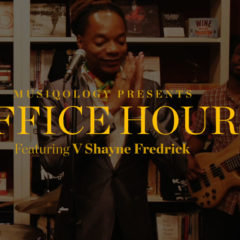This is the first edition of the Extended Play series, a new MusiQology miniseries on a theme or concept that deserves more than a single-article treatment. Giving our contributors the space to explore and develop this type of work is important because the proliferation and justification of concepts is an important skill for academic writing. Like the EP for musicians, these give us, our writers, and our readers the chance to explore themes and concepts, testing them out before delivering the full album.
Over the next several weeks, MusiQology Managing Editor John Vilanova will be doing a deep hypothetical exploration of the 2018 GRAMMY Awards nominees for Album of the Year. Each article will ask the same question of a different artist: “What would a win by this artist mean?”
“There are a lot of people who have this mixed background that are in this gray zone. A lot of people think, ‘This is awesome. You’re in this gray zone, so you can pass for whatever the hell you want.’ But it’s not like that at all. It’s actually the exact opposite. What we’re trying to do is educate people to know what that feels like so they’ll never make someone feel like that ever again. Which is a hard thing to do. Because no one can see what we see and no one can grow up with what we grew up with. I hope people of color can look at me, and they know that everything they’re going through, I went through. I promise you.”
That quote, from Bruno Mars in a recent cover story for Latina magazine, was part of a pretty striking move by the 24K Magic singer, who is another candidate for the Album of the Year GRAMMY, which will be awarded this Sunday, January 29. Addressing his ethnoracial identity, Mars had a kind of coming-out, where he went to great lengths to turn down his Teflon image and address a fundamental (and complicated) question that has dogged his rise: “What are you?”
The answer is Filipino. And Hawaiian. And Puerto Rican. And Jewish. And a lot more.
The reason that question begs ethnic answers is a kind of discursive clue: One’s ethnic identity is assumed and supposed to lend the asker a wealth of information about culture, tastes, and social status. In the same way that “Where are you from?” carries with it a kind of spatial politics that suggest that racially marked people couldn’t be “from” the place where the question originated, “What are you?” suggests a kind of essentializing surety. Finding out what someone “is” gives us solid ground for cultural references, assumptions, and compartmentalization. It’s a question that speaks volumes.
It is also what is so unsettling for many about Mars, a non-black musician who makes black music. Or so people claim. Mars’s racial ambiguity has led to a series of confusions and uncertainties. And while he has never been shy about his identity, to some extent, the confusion and slipperiness of it can connect to how we consider his Album of the Year candidacy and his musical output. This is not a criticism of him at all. But the music industry (and music fans) continued difficulty with him means something in this nexus of race and music that needs to continue to be interrogated.
Specifically, Mars has been accused of cultural appropriation. The argument—which, again, is complicated and not necessarily cosigned here—goes that Mars makes black music but he, himself is not black. That irreconcilability creates a great deal of dissonance for critics and fans. He sounds like Michael Jackson; his music recalls James Brown. But he’s trespassing, crossing some unseen line and reaping benefits and acclaim, a kind of cultural smudger whose trip “Uptown” with Mark Ronson is a lot of things. It’s poppy, disco-y, dance-y. But it’s not funk.
And that, I think, is what is so telling about Mars’s Album of the Year candidacy. Mars’s greatest strength…his secret weapon…is that he is a kind of translator, bringing black musical tropes to the radio in a ready, unthreatening way. Crossing over—a goal for black artists lumped into nonsensically named categories like “urban”—comes easy for Mars, whose good looks, outstanding studio production team, and fluency across genres (and therefore their attending races) make him a perfect pop star. He was even a childhood Elvis impersonator! If a record label wanted to come up with a robot designed to achieve pop superstardom, wouldn’t Mars be the Terminator?
It’s probably fitting that the 1980s—the era of black music from which Mars is most clearly derivative—was the best decade for black male attention in the category. Other than the Stevie Wonder-dominated 1970s, the 80s featured wins by Michael Jackson and Lionel Richie, with nominations for Quincy Jones, Prince, and Jackson. Mars recalls a high time for the business; his music is opulent and celebratory, seldom getting down into the muck that leads artists astray, pursuing things other than that perfect sound that GRAMMY voters can hear, even if the masses can’t. In fact, he’s probably the favorite to win and realize the music industry’s greatest aim—to award itself for the good times, everyone’s-invited-party that his music is playing at. Constantly.
In addition to being a translator, Mars is also a kind of open signifier, who has drawn comparisons to The Police and impersonated Prince at last year’s GRAMMYs. What other artist could lay such capable claim to so much of the pop songbook? What other artist could unintentionally lend validity to Neil Portnow’s “blindfold test” when he so capably performs a postgenre, postracial package? A win for Mars is a win for music…full stop. And that is what is so uncomfortable about it.

 Share On Facebook
Share On Facebook Tweet It
Tweet It








